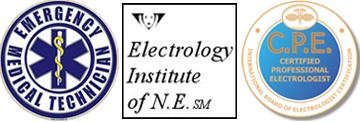Electrolosis Process
A small electric current is transmitted by a fine, sterile probe (or needle) directly into the natural opening of the hair follicle, destroying the dermal papilla, the matrix, and an area called "the bulge", all of which cause hair to grow and regenerate.

Hair Removal for Men

Men who feel they have too much hair may seek electrolysis treatment. Even without an excess amount of hair, electrolysis is frequently used for eyebrow shaping as well as underarms, groin, arms and legs, lower back and buttocks. Men also receive treatments on their ears, eyebrows, beard-lines, chests, backs and genitals.
The most commonly treated areas for men are: Back (including shoulders and torso) - Ears - Brows - Cheeks (to clean up beard line) - Neckline - Nape - Groin - Hands
How Does It Work?
How does electrolysis work?
A professional electrologist inserts a very fine needle (usually thinner than the hair being treated) into the natural opening of the hair follicle alongside the hair shaft. A tiny amount of electrical current is then applied to destroy the hair growth cells.
What are modalities?
Medical electrolysis devices can destroy the hair growth cells with chemical energy, heat energy, or both. The method chosen by the electrologist is the modality. All are effective. There are three modalities in current use:
Galvanic electrolysis is a chemical process. The current produces a chemical reaction in the hair follicle eliminating the hair growth cells.
Thermolysis (also called short-wave) produces heat. This modality heats and destroys the hair growth cells in the follicle. A higher intensity current can be applied for less time in the follicle, or current can be used at lower intensity with longer timing.
The Blend method combines galvanic current with thermolysis current. Thermolysis heats up the chemical reaction in the follicle destroying hair growth cells.
What does electrolysis feel like?
You'll probably feel a momentary heat sensation or pinch. Discomfort is minimal for most people, but individual tolerances vary greatly. Keep in mind that some areas of the body are much less sensitive than others. Many people read, listen to music or even take a nap while being treated.
What about after treatment?
Immediately following treatment, you may experience slight redness or tenderness which usually disappears in a couple of hours. There is very little risk of complication or serious skin irritation with electrolysis performed by a skilled practitioner. For the first 24 hours following treatment, it's best to avoid activity that could irritate hair follicles such as excessive sweating, tanning and prolonged sun exposure or make-up application.
How long will my electrolysis treatment take?
Depending on the area you want cleared, it could be a few minutes for a followup appointment to an hour for a larger area. Most people who follow the recommended treatment plan can expect to be completed or nearly completed within 18 months. Factors such as hair growth cycles, the quantity and structure of hair presented, previous use of temporary hair removal methods, heredity, hormone function, certain medications and stress influence the treatment program for each individual.
Are all hairs eliminated in one treatment or is regrowth to be expected?
Excessive hair growth, also known as hirsutism, can range from fine, vellus hair to dark, coarse hair on the face and body. Breaking down the hair growth cells on deep, coarse hairs may require more than one treatment. Based on a personal and confidential consultation, your electrologist will design a treatment plan that addresses your specific hair removal needs.
For Facial Areas

Electrolysis is the only medically recognized way to permanently remove unsightly hair and is used on many body areas including:
- Upper lip
- Chin
- Eyebrows
- White, gray or red hairs
- Ears
The most commonly treated areas for men are: Back (including shoulders and torso) - Ears - Brows - Cheeks (to clean up beard line) - Neckline - Nape - Groin - Hands
Hair Removal for Women

Almost all areas of the body can be subject to unwelcome hair growth. For women, the unwanted hair on commonly visible areas, like the face, usually takes priority.
Hair growth in the chin, upper lip, jaw, and throat areas is usually caused by hormones, whether imbalanced or not. Genetics and medications can also cause excess hair on the face and on body areas such as the chest, breasts and abdomen.
The most commonly treated areas for women are: Chin - Jawline - Upper lip - Throat - Sides of face - Eyebrows - Chest - Abdomen - Breasts - Underarms - Hairline - Fingers and toes
WE USE ONLY THE HIGHEST QUALITY EQUIPMENT
100% PERMANENT RESULTS MORE RAPIDLY
ABC Electrology, LLC selected this equipment because of the high quality and results
From the manufacturer: The effectiveness of the Apilus Platinum Pure device has been confirmed in comparative scientific studies performed in cooperation with Dr. Charles Doillon, research scientist and professor at the Université Laval Hospital Center in Québec City, Canada. With the energy concentration of the Apilus Platinum Pure, it is possible to obtain results much more rapidly than with any other epilator currently on the market. Due to the ultrarapid 27 MHz radio frequency applied precisely inside the follicle, the Apilus Platinum Pure can permanently eliminate all hair cells. The number of treatments to obtain complete and permanent results is 25% less than usual. Moreover, the Apilus Platinum Pure can effectively treat any hair or skin color, an achievement that laser or intense pulse light (IPL) devices can’t reproduce.





